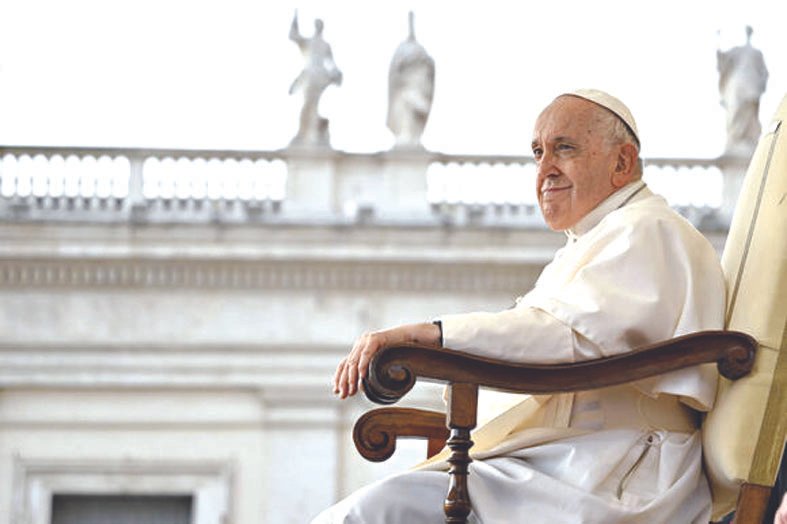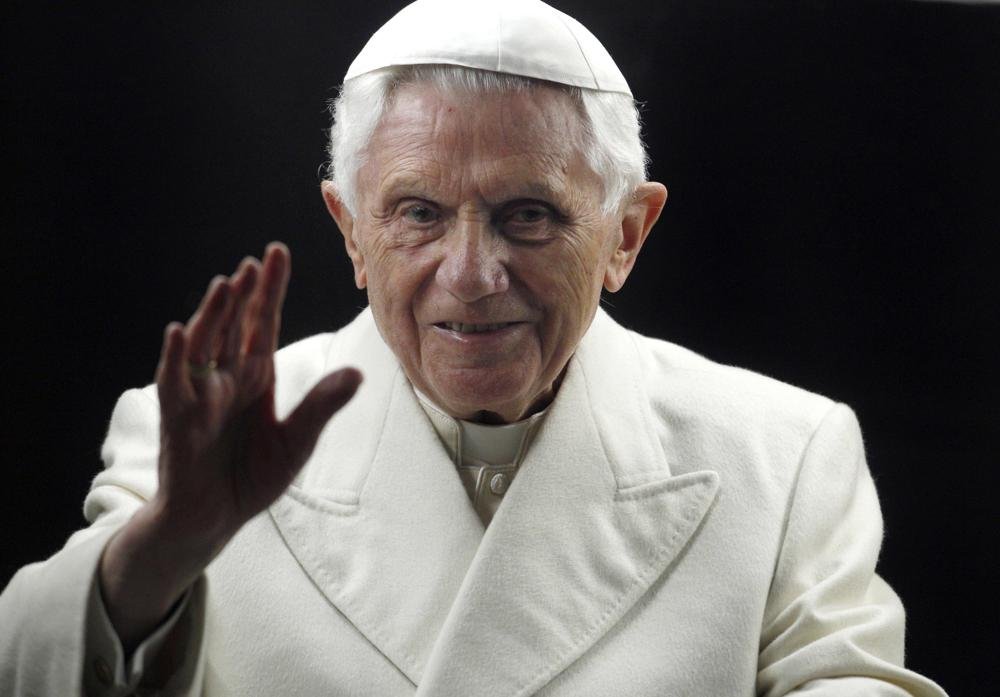VATICAN CITY, April 21: Pope Francis, history’s first Latin American pontiff who charmed the world with his humble style and concern for the poor but alienated conservatives with critiques of capitalism and climate change, has died on Monday. He was 88.
“At 7:35 this morning, the Bishop of Rome, Francis, returned to the home of the Father. His entire life was dedicated to the service of the Lord and of his Church Cardinal,” Kevin Ferrell, the Vatican camerlengo, said in an announcement.
Francis, who suffered from chronic lung disease and had part of one lung removed as a young man, was admitted to Gemelli hospital on February 14, 2025, for a respiratory crisis that developed into double pneumonia.
He spent 38 days there, the longest hospitalisation of his 12-year papacy.
From his first greeting as pope — a remarkably normal “Buonasera” (“Good evening”) — to his embrace of refugees and the downtrodden, Francis signalled a very different tone for the papacy, stressing humility over hubris for a Catholic Church beset by scandal and accusations of indifference.
After that rainy night on March 13, 2013, the Argentine-born Jorge Mario Bergoglio brought a breath of fresh air into a 2,000-year-old institution that had seen its influence wane during the troubled tenure of Pope Benedict XVI, whose surprise resignation led to Francis’ election.
But Francis soon invited troubles of his own, and conservatives grew increasingly upset with his progressive bent, outreach to LGBTQ+ Catholics and crackdown on traditionalists. His greatest test came in 2018 when he botched a notorious case of clergy sexual abuse in Chile, and the scandal that festered under his predecessors erupted anew on his watch.
And then Francis, the crowd-loving, globe-trotting pope of the peripheries, navigated the unprecedented reality of leading a universal religion through the coronavirus pandemic from a locked-down Vatican City.
He implored the world to use COVID-19 as an opportunity to rethink the economic and political framework that he said had turned rich against poor.
“We have realised that we are on the same boat, all of us fragile and disoriented,” Francis told an empty St. Peter’s Square in March 2020. But he also stressed the pandemic showed the need for “all of us to row together, each of us in need of comforting the other”.
Reforming the Vatican
Francis was elected on a mandate to reform the Vatican bureaucracy and finances but went further in shaking up the church without changing its core doctrine. “Who am I to judge?” he replied when asked about a purportedly gay priest.
The comment sent a message of welcome to the LGBTQ+ community and those who felt shunned by a church that had stressed sexual propriety over unconditional love. “Being homosexual is not a crime,” he told The Associated Press in 2023, urging an end to civil laws that criminalise it.
Stressing mercy, Francis changed the church’s position on the death penalty, calling it inadmissible in all circumstances. He also declared the possession of nuclear weapons, not just their use, was “immoral”.
In other firsts, he approved an agreement with China over bishop nominations that had vexed the Vatican for decades, met the Russian patriarch and charted new relations with the Muslim world by visiting the Arabian Peninsula and Iraq.
He reaffirmed the all-male, celibate priesthood and upheld the church’s opposition to abortion, equating it to “hiring a hitman to solve a problem”.
The church as refuge
While Francis did not allow women to be ordained, the voting reform was part of a revolutionary change in emphasizing what the church should be: a refuge for everyone — “todos, todos, todos” (“everyone, everyone, everyone”) — not for the privileged few.
Migrants, the poor, prisoners and outcasts were invited to his table far more than presidents or powerful CEOs.
“For Pope Francis, it was always to extend the arms of the church to embrace all people, not to exclude anyone,” said Cardinal Kevin Farrell, whom Francis named as camerlengo, taking charge after a pontiff’s death or retirement.
Francis demanded his bishops apply mercy and charity to their flocks, pressed the world to protect God’s creation from climate disaster, and challenged countries to welcome those fleeing war, poverty and oppression.
After visiting Mexico in 2016, Francis said of then-US presidential candidate Donald Trump that anyone building a wall to keep migrants out “is not Christian”.
While progressives were thrilled with Francis’ radical focus on Jesus’ message of mercy and inclusion, it troubled conservatives who feared he watered down Catholic teaching and threatened the very Christian identity of the West. Some even called him a heretic.
A few cardinals openly challenged him. Francis usually responded with his typical answer to conflict: silence.
He made it easier for married Catholics to get an annulment, allowed priests to absolve women who had had abortions and decreed that priests could bless same-sex couples. He opened debate on issues like homosexuality and divorce, giving pastors wiggle room to discern how to accompany their flocks, rather than handing them strict rules to apply.
A change from Benedict
The road to Francis’ 2013 election was paved by Pope Benedict XVI’s decision to resign and retire — the first in 600 years — and it created the unprecedented reality of two popes living in the Vatican.
Francis didn’t shy from Benedict’s potentially uncomfortable shadow. He embraced him as an elder statesman and adviser, coaxing him out of his cloistered retirement to participate in the public life of the church.
“It’s like having your grandfather in the house, a wise grandfather,” Francis said.
Francis praised Benedict by saying he “opened the door” to others following suit, fueling speculation that Francis also might retire. But after Benedict’s death on Dec. 31, 2022, he asserted that in principle the papacy is a job for life.
Francis’ looser liturgical style and pastoral priorities made clear he and the German-born theologian came from very different religious traditions, and Francis directly overturned several decisions of his predecessor.
He made sure Salvadoran Archbishop Óscar Romero, a hero to the liberation theology movement in Latin America, was canonized after his case languished under Benedict over concerns about the credo’s Marxist bent.
Francis reimposed restrictions on celebrating the old Latin Mass that Benedict had relaxed, arguing the spread of the Tridentine Rite was divisive. The move riled Francis’ traditionalist critics and opened sustained conflict between right-wing Catholics, particularly in the US, and the Argentine pope.
Conservatives oppose Francis
By then, conservatives had already turned away from Francis, betrayed after he opened debate on allowing remarried Catholics to receive the sacraments if they didn’t get an annulment — a church ruling that their first marriage was invalid.
“We don’t like this pope,” headlined Italy’s conservative daily Il Foglio a few months into the papacy, reflecting the unease of the small but vocal traditionalist Catholic movement that was coddled under Benedict.
Those same critics amplified their complaints after Francis’ approved church blessings for same-sex couples, and a controversial accord with China over nominating bishops.
Its details were never released, but conservative critics bashed it as a sellout to communist China, while the Vatican defended it as the best deal it could get with Beijing.
US Cardinal Raymond Burke, a figurehead in the anti-Francis opposition, said the church had become “like a ship without a rudder”.
Burke waged his opposition campaign for years, starting when Francis fired him as the Vatican’s supreme court justice and culminating with his vocal opposition to Francis’ 2023 synod on the church’s future.
Twice, he joined other conservative cardinals in formally asking Francis to explain himself on doctrine issues reflecting a more progressive bent, including on the possibility of same-sex blessings and his outreach to divorced and civilly remarried Catholics.
Francis eventually sanctioned Burke financially, accusing him of sowing “disunity”. It was one of several personnel moves he made in both the Vatican and around the world to shift the balance of power from doctrinaire leaders to more pastoral ones.
Francis insisted his bishops and cardinals imbue themselves with the “odour of their flock” and minister to the faithful, voicing displeasure when they didn’t.
His 2014 Christmas address to the Vatican Curia was one of the greatest public papal reprimands ever: Standing in the marbled Apostolic Palace, Francis ticked off 15 ailments that he said can afflict his closest collaborators, including “spiritual Alzheimer’s”, lusting for power and the “terrorism of gossip”.
Trying to eliminate corruption, Francis oversaw the reform of the scandal-marred Vatican bank and sought to wrestle Vatican bureaucrats into financial line, limiting their compensation and ability to receive gifts or award public contracts.
He authorised Vatican police to raid his own secretariat of state and the Vatican’s financial watchdog agency amid suspicions about a 350 million euro investment in a London real estate venture.
After a 2 1/2-year trial, the Vatican tribunal convicted a once-powerful cardinal, Angelo Becciu, of embezzlement and returned mixed verdicts to nine others, acquitting one.
The trial, though, proved to be a reputational boomerang for the Holy See, showing deficiencies in the Vatican’s legal system, unseemly turf battles among monsignors, and how the pope had intervened on behalf of prosecutors.
While earning praise for trying to turn the Vatican’s finances around, Francis angered US conservatives for his frequent excoriation of the global financial market that favours the rich over the poor.
Economic justice was an important themes of his papacy, and he didn’t hide it in his first meeting with journalists when he said he wanted a “poor church that is for the poor”.
In his first major teaching document, “The Joy of the Gospel,” Francis denounced trickle-down economic theories as unproven and naive, based on a mentality “where the powerful feed upon the powerless” with no regard for ethics, the environment or even God.
“Money must serve, not rule!” he said in urging political reforms.
He elaborated on that in his major eco-encyclical “Praised Be”, denouncing the “structurally perverse” global economic system that he said exploited the poor and risked turning Earth into “an immense pile of filth”.
Some US conservatives branded Francis a Marxist. He jabbed back by saying he had many friends who were Marxists. (AP)












